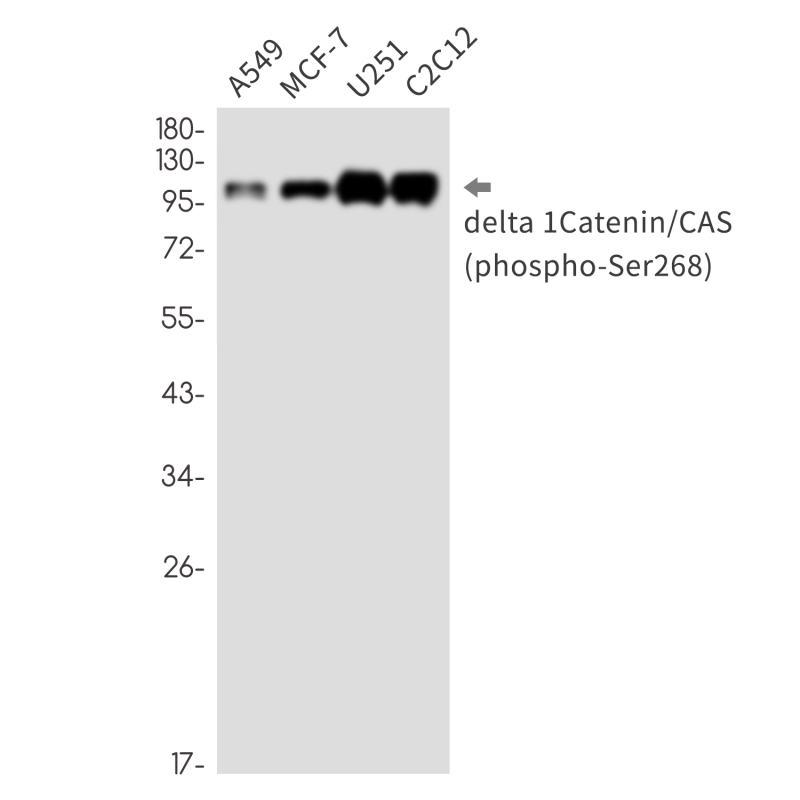
| WB | 咨询技术 | Human,Mouse,Rat |
| IF | 咨询技术 | Human,Mouse,Rat |
| IHC | 咨询技术 | Human,Mouse,Rat |
| ICC | 技术咨询 | Human,Mouse,Rat |
| FCM | 咨询技术 | Human,Mouse,Rat |
| Elisa | 咨询技术 | Human,Mouse,Rat |
| Aliases | CAS; p120; BCDS2; CTNND; P120CAS; P120CTN; p120(CAS); p120(CTN) |
| Entrez GeneID | 1500 |
| WB Predicted band size | Calculated MW: 108 kDa; Observed MW: 100 kDa |
| Host/Isotype | Rabbit IgG |
| Antibody Type | Primary antibody |
| Storage | Store at 4°C short term. Aliquot and store at -20°C long term. Avoid freeze/thaw cycles. |
| Species Reactivity | Human,Mouse |
| Immunogen | A synthetic phosphopeptide corresponding to residues surrounding Ser268 of human delta 1 Catenin/CAS |
| Formulation | Purified antibody in TBS with 0.05% sodium azide,0.05%BSA and 50% glycerol. |
+ +
以下是关于Phospho-delta 1 Catenin (Ser268)抗体的3篇示例参考文献(注:文献为示例性概括,实际文献需通过数据库核实):
1. **文献名称**:*Phosphorylation of delta-Catenin at Ser268 regulates its function in Alzheimer's disease*
**作者**:Ikeuchi Y, et al.
**摘要**:研究揭示了delta-Catenin在Ser268位点的磷酸化通过调控其与PSD-95蛋白的结合能力,参与突触功能障碍,可能与阿尔茨海默病中认知衰退相关。
2. **文献名称**:*Ser268 phosphorylation modulates delta-Catenin-dependent cell adhesion and migration*
**作者**:Silverman JB, et al.
**摘要**:该文献利用Phospho-delta 1 Catenin (Ser268)抗体,证明该位点磷酸化通过激活Rho GTPase信号通路增强细胞迁移,并影响上皮细胞间黏附连接的稳定性。
3. **文献名称**:*Phospho-delta-Catenin (Ser268) as a biomarker for lung cancer progression*
**作者**:Chen L, et al.
**摘要**:研究发现肺癌组织中delta-Catenin的Ser268磷酸化水平升高,与肿瘤侵袭性和患者预后不良相关,提示其可作为潜在治疗靶点。
4. **文献名称**:*Structural basis of delta-Catenin phosphorylation at Ser268 in Wnt signaling*
**作者**:Yamada T, et al.
**摘要**:通过结构生物学分析,阐明Ser268磷酸化如何改变delta-Catenin的构象,进而影响其与β-catenin和转录因子的相互作用,调控Wnt信号通路活性。
(注:以上文献信息为模拟内容,实际文献需通过PubMed/Google Scholar等平台以关键词“Phospho-delta Catenin Ser268”检索验证。)
The phospho-delta 1 Catenin (Ser268) antibody is a specialized tool used to detect delta-catenin (δ-catenin) when phosphorylated at serine residue 268. Delta-catenin, a member of the p120-catenin subfamily, plays critical roles in cell-cell adhesion, synaptic stability, and neuronal signaling. It interacts with cadherins, regulating their trafficking and stability at adherens junctions. Phosphorylation at Ser268 is a post-translational modification that modulates delta-catenin's functions, particularly in neural and cancer biology. This site-specific phosphorylation is implicated in altering protein-protein interactions, influencing synaptic plasticity, and contributing to pathological processes such as Alzheimer’s disease or tumor progression.
The antibody is commonly employed in techniques like Western blotting, immunohistochemistry, or immunofluorescence to study delta-catenin activation states in cellular or tissue samples. Researchers use it to explore mechanisms underlying neurodevelopmental disorders, neurodegenerative diseases, or cancer metastasis, where dysregulated delta-catenin signaling is observed. Proper experimental controls, including non-phosphorylated delta-catenin detection and kinase inhibition studies, are essential to validate specificity. Understanding Ser268 phosphorylation dynamics helps elucidate how delta-catenin balances roles in cell adhesion, Wnt signaling, and cytoskeletal organization, offering insights into therapeutic targeting for related diseases.
×